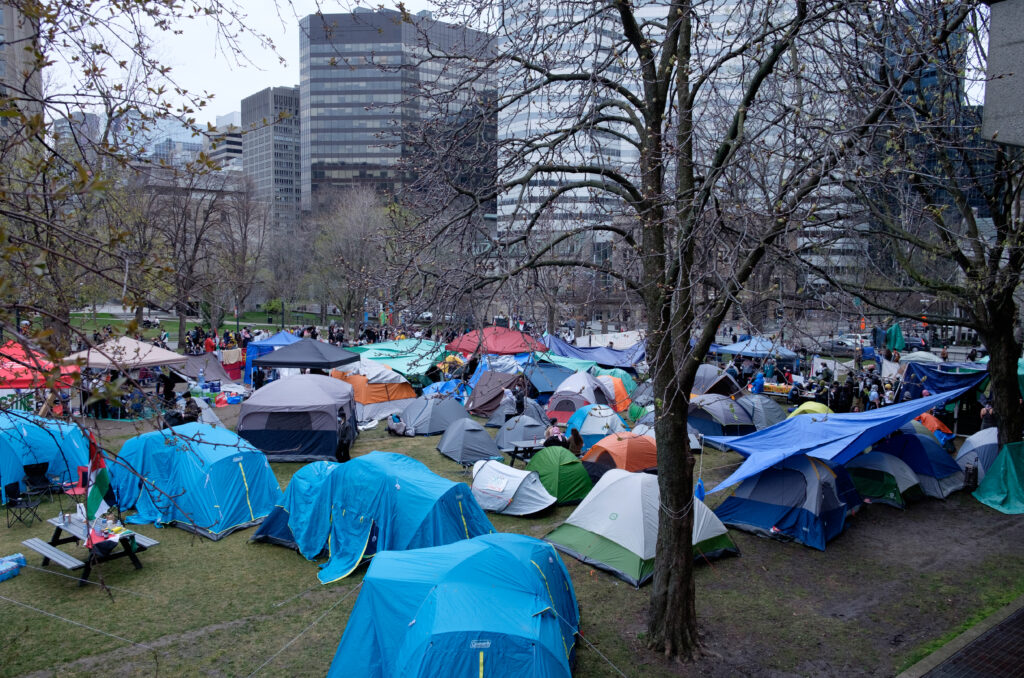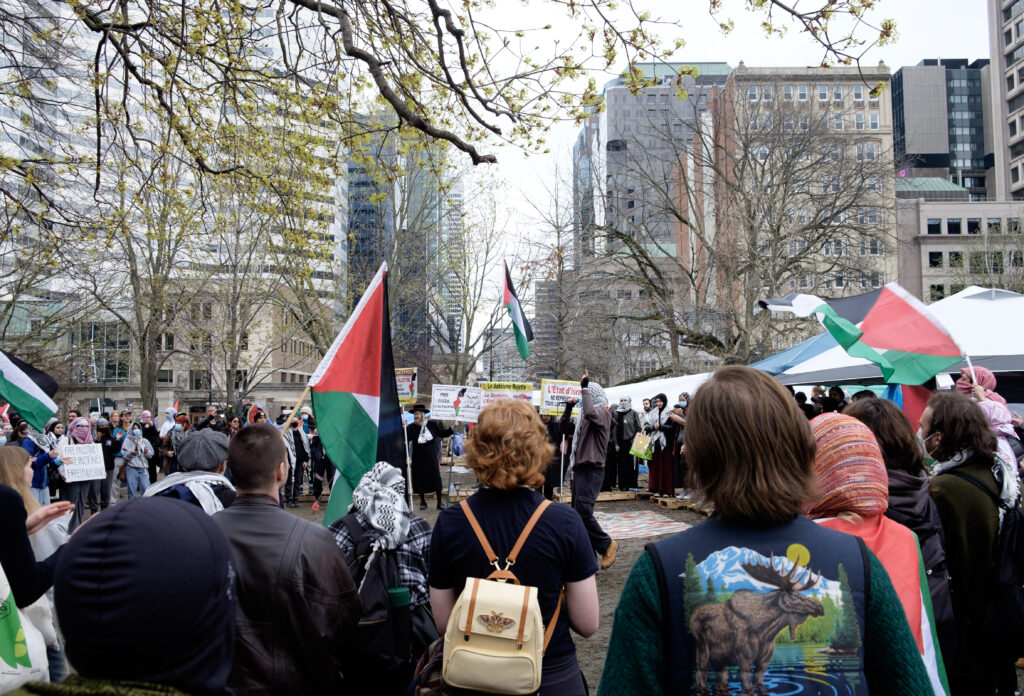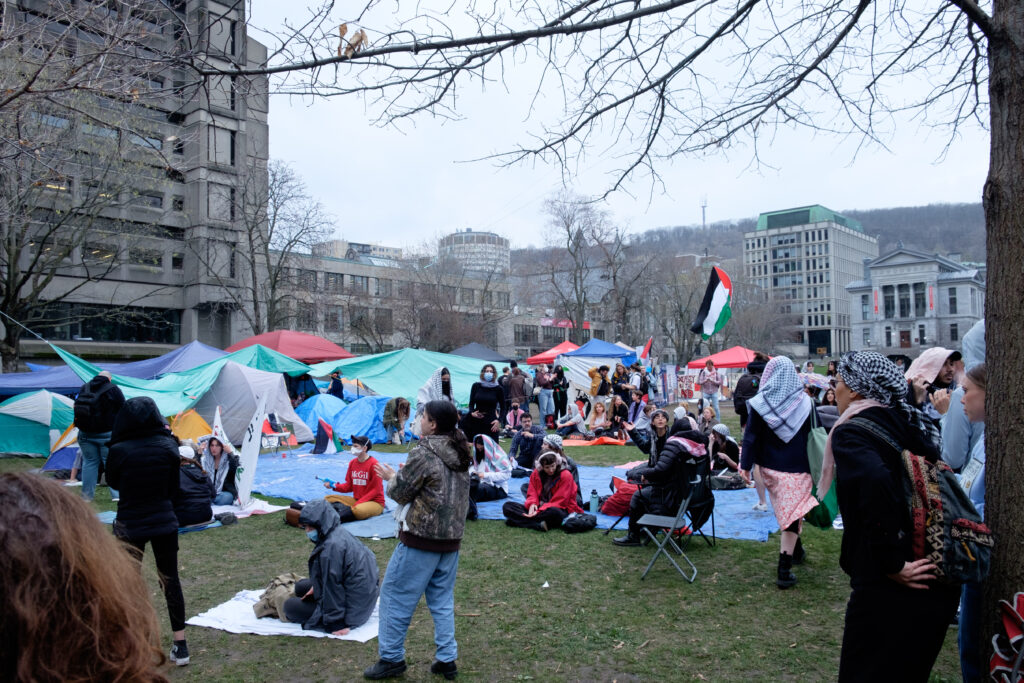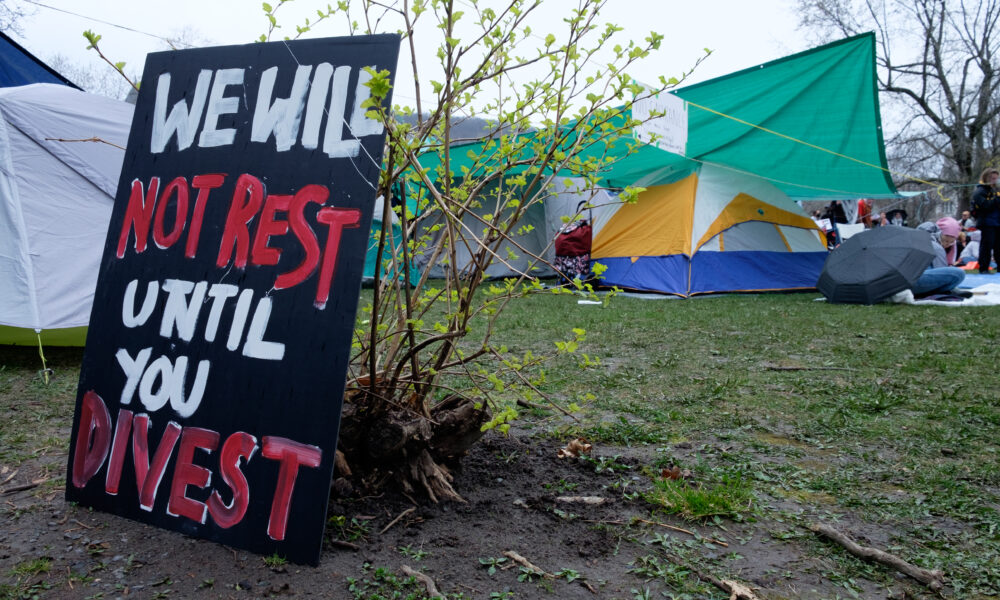In the late afternoon of April 27, protesters led by students from McGill, Concordia University, and Université du Québec à Montréal (UQÀM) set up an encampment of around 20 tents on the lower field of McGill’s downtown campus to protest the universities’ complicity in the Israeli state’s genocide of Palestinians. Protestors demand that these universities disclose and divest from all financial ties to companies complicit in the genocide of Palestinians, condemn the siege on Gaza, and urge the Canadian government to end military contracts with Israel. Protestors also call for universities to protect students from any repercussions for protesting.
Solidarity for Palestinian Human Rights (SPHR) at McGill is among the student groups that organized the encampment. In an interview on April 29, a representative from SPHR at McGill who wished to be unnamed explained that the decision to begin the encampment came after the McGill administration refused to meet Palestinian solidarity groups’ demands throughout months of mobilization on campus.
“We’ve tried in so many ways to get McGill admin to listen to us, and they’re just not. Even now we’re presenting our demands and they’re not willing to negotiate according to the demands,” the representative told The Tribune.
The representative also explained that student groups from various Montreal universities chose McGill’s campus as the site of the encampment because of McGill’s renowned national reputation. The “ideal” location of the lower field was another important benefit of establishing the encampment at McGill as it is sheltered from cars and busy streets.
“McGill is one of the biggest schools [in] Montreal. It’s also got a really big reputation all over Canada, [and] it’s unprecedented that any encampment would happen at McGill,” they said.
The SPHR representative also stated that morale within the encampment was high, and noted that the encampment was continuing to grow in size. As of April 29, there were roughly 40 tents, with protesters including both students and professors.

Since April 27, McGill has sent multiple emails to staff and students providing updates on the university’s response to the encampment. In an email to the McGill community on April 27, Deputy Provost (Student Life and Learning) Fabrice Labeau stated that while the university “support[s] the rights of our campus community to freedom of expression and freedom of assembly within the bounds of McGill’s policies and the law,” the encampment violates these measures by occupying university property without approval.
On April 29, McGill President Deep Saini claimed that protestors at the encampment had used “hateful rhetoric” and expressed that he was upset “to see individuals occupying our campus to use it as a platform for obvious antisemitism.” Saini also denounced the encampment as a violation of McGill’s policies and the law, as well as a security risk.
In an interview with The Tribune on May 2, an organizer of the encampment—a McGill student who wished to remain unnamed—criticized the university’s representation of the encampment as potentially dangerous in their recent communications.
“This is obviously a peaceful encampment, as we have seen so far,” the organizer said. “None of our protestors have created any high tensions [….] As long as the administration undermines us, we’re going to be here. We won’t move until our demands are met.”
McGill released a statement on April 30 informing the public that the university had completed each step of their protocol regarding demonstrations on campus, and that they had chosen to involve police to resolve the issue.
The following day, Saini put out a statement condemning the presence of groups not affiliated with the university at the encampment.
“[N]o one, let alone individuals from outside McGill, has the right to set up an encampment on the University’s property, including the grounds,” Saini wrote. “Therefore, the encampment must be dismantled quickly, and this is non-negotiable.”
Saini went on to note that if McGill community members left the encampment, he would hold a forum for them to discuss their demands. Protestors did not take up Saini’s offer.

The encampment has also faced legal challenges from other students. On May 1, Quebec Superior Court Justice Chantal Masse rejected an injunction request put forth by McGill students Gabriel Medvedovsky and Raihaana Adira which sought to prohibit protesters from demonstrating within 100 metres of any McGill building over beliefs that the encampment threatened students’ safety. Justice Masse ruled that the defendants did not prove that the encampment blocked access to the campus or caused students harm.
Medvedovsky wished not to provide a comment to The Tribune. Adira could not be reached for comment in time for publication.
In an email to The Tribune on May 1, McGill Media Relations Officer Frédérique Mazerolle stated that McGill was “encouraged” by Justice Masse’s finding that the protestors were illegally occupying the area and that the university followed its protocols in responding to the encampment.
“[I]t must be emphasized that McGill University, […] was proactive, applied the process it set out, tried to negotiate an agreement for a progressive dismantling with the respect of certain conditions, gave warnings in the absence of an agreement and, finally, called for police assistance as a last resort, in order to put an end to this situation,” Justice Masse wrote in the ruling.
Since it was created, the encampment has also been a site of gathering for students, professors, and members of the wider Montreal community who wish to support it. Daily rallies, movie screenings, and group discussions are among the activities protestors have organized on the lower field.
Two Concordia students, who wished to be unnamed, expressed frustration at the failure of their university and McGill to respond to the demands of student protestors, but highlighted the importance of the encampment in compelling them to act.
“I think the universities will have to respond,” one student told The Tribune. “Even though we are students at their university doesn’t mean that we agree or are complicit in how they choose to operate.”

On May 2 at around 12:30 p.m., counter-protestors congregated on Sherbrooke Street in front of Roddick Gates across from the encampment to express their support for Israel. Some also called for the encampment to be dismantled. Earlier that morning, McGill alerted staff and students via email that police had been mobilized to campus and that the gates were closed for public use. The counter-demonstration left at roughly 3:15 p.m. and the gates were reopened soon after.
A McGill student present at the encampment on May 2, who wished to remain unnamed, was critical of the university’s involvement of police in their response to the demonstrations.
“It’s just appalling because […] they’re clearly trying to portray that [McGill] admin are the ones being reasonable, we’re the ones being unreasonable. But you’re sending our tuition money to fund genocide. Like, who’s really being violent here,” they told The Tribune.
Another Montreal community member who wished to remain anonymous explained to The Tribune on May 2 that they had been regularly coming to support the encampment before and after work. They noted that they felt less safe with the significant police presence on campus at the time, but also highlighted the importance of the community supporting the encampment to ensure it is not dismantled during the night.
“I think just being united, and having our presence, especially after midnight, is important,” they said. “It’s nice to have that presence. People were kicking soccer balls around at night, sharing food, making warm drinks, coffee, tea, things like that. It’s so sweet to see just like the community support, despite the police presence.”









